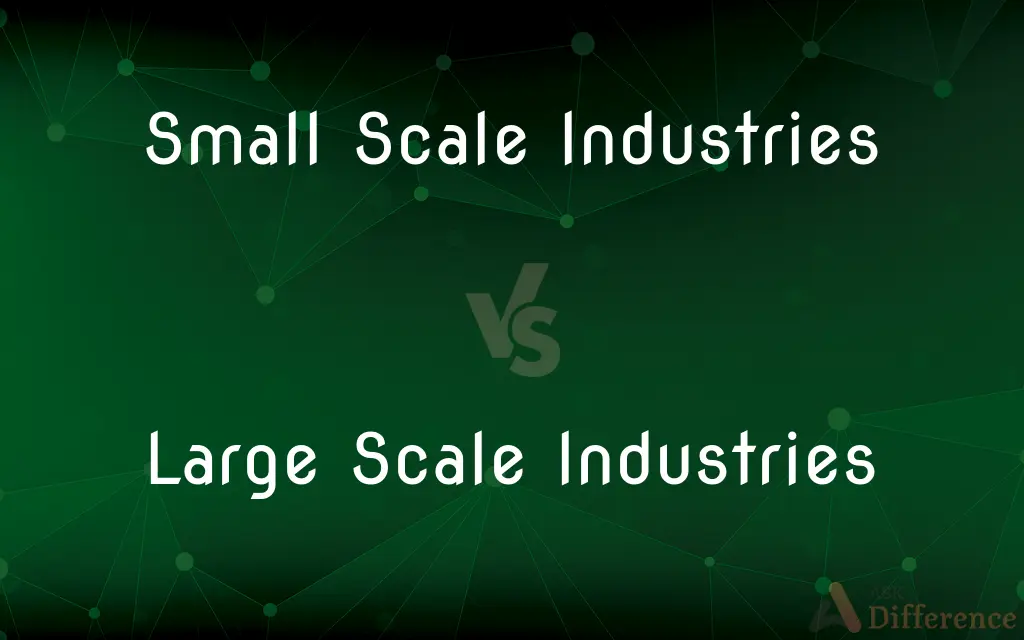Small Scale Industries vs. Large Scale Industries — What's the Difference?
Edited by Tayyaba Rehman — By Fiza Rafique — Published on December 30, 2023
Small Scale Industries operate with limited resources and produce fewer goods, while Large Scale Industries have vast resources and produce goods on a massive scale.

Difference Between Small Scale Industries and Large Scale Industries
Table of Contents
ADVERTISEMENT
Key Differences
Small Scale Industries often represent the grassroots level of an economy, focusing on local or niche markets. They usually require less capital investment and employ fewer people compared to their counterparts. On the other hand, Large Scale Industries operate on a grander scale, often catering to global markets, and are key players in the industrial sector.
When considering the operational scope, Small Scale Industries often cater to regional demands or specific niches. They might produce specialty items or provide localized services. Large Scale Industries, however, are involved in mass production and can cater to widespread, even international demands, with a more diversified product range.
Financially, Small Scale Industries typically have a modest turnover, limited access to markets, and might rely on local financial institutions for funding. In contrast, Large Scale Industries have significant turnovers, access to bigger markets, and might be listed on stock exchanges, attracting investment from all over the world.
From an employment perspective, Small Scale Industries play a crucial role in providing local employment opportunities and fostering entrepreneurial spirit. They might be family-owned or operated by a small team. Large Scale Industries, however, employ thousands to millions of individuals, often with a hierarchical organizational structure.
The impact of both types of industries on economies is distinct yet intertwined. Small Scale Industries boost local economies, promote innovation, and maintain cultural products or services. Large Scale Industries, meanwhile, significantly influence national GDP, exports, and international trade dynamics.
ADVERTISEMENT
Comparison Chart
Operational Scope
Localized or niche markets
Mass production, often global
Capital Investment
Limited capital investment
Significant capital investment
Employment
Fewer employees, possibly family-owned
Thousands to millions of employees
Financial Turnover & Access
Modest turnover, local financial reliance
High turnover, global financial access
Influence on Economy
Boosts local economies, promotes innovation
Influences national GDP, exports, international trade dynamics
Compare with Definitions
Small Scale Industries
Small Scale Industries: Foster local entrepreneurial spirit.
Example: Small Scale Industries like boutique stores give cities unique character.
Large Scale Industries
Large Scale Industries: Require significant capital investment.
Example: Major tech companies are part of Large Scale Industries with expansive infrastructure.
Small Scale Industries
Small Scale Industries: Businesses with limited production and manpower capacity.
Example: Local artisans often represent Small Scale Industries, crafting unique products.
Large Scale Industries
Large Scale Industries: Major contributors to national and global economies.
Example: Oil refineries as Large Scale Industries significantly impact international trade dynamics.
Small Scale Industries
Small Scale Industries: Cater to local or niche markets.
Example: A regional condiment manufacturer is an example of Small Scale Industries.
Large Scale Industries
Large Scale Industries: Businesses with massive production and a large workforce.
Example: Automobile manufacturers represent Large Scale Industries due to vast production.
Small Scale Industries
Small Scale Industries: Typically not heavily mechanized.
Example: Handmade jewelry shops fall under Small Scale Industries due to manual production.
Large Scale Industries
Large Scale Industries: Often have mechanized and automated processes.
Example: Large Scale Industries like electronics factories utilize advanced machinery for production.
Small Scale Industries
Small Scale Industries: Operate with limited financial resources.
Example: Many Small Scale Industries are self-funded or rely on community support.
Large Scale Industries
Large Scale Industries: Produce goods for widespread or global markets.
Example: Beverage giants in Large Scale Industries distribute products globally.
Common Curiosities
Can Small Scale Industries become Large Scale Industries?
Yes, with growth, expansion, and increased resources, Small Scale Industries can evolve into Large Scale Industries.
Why are Small Scale Industries important to local economies?
Small Scale Industries provide local employment, maintain cultural products, and can boost local economies.
How do Large Scale Industries differ from Small Scale ones?
Large Scale Industries operate on a grand scale, have vast resources, produce goods in large quantities, and often cater to global markets.
Do Large Scale Industries employ more people than Small Scale Industries?
Yes, Large Scale Industries typically employ a significantly larger number of people compared to Small Scale Industries.
Are Small Scale Industries usually family-owned?
Many Small Scale Industries can be family-owned, but it's not a strict criterion.
What are Small Scale Industries?
Small Scale Industries operate on a limited scale with fewer resources, often catering to local or niche markets.
Which type of industry is more agile in adapting to market changes?
Typically, Small Scale Industries can be more agile due to their size, but it varies based on management.
Which has a broader product range?
Large Scale Industries often have a more diversified product range due to their scale.
Are Small Scale Industries more environmentally friendly?
Not necessarily. While some might have a smaller carbon footprint due to size, it varies based on the industry and practices.
Which type is more susceptible to market risks?
Small Scale Industries might face more immediate risks due to limited resources, but both are susceptible in different ways.
Are Large Scale Industries always corporations?
No, while many are corporations, the size and structure can vary.
Do Large Scale Industries usually export their products?
Many Large Scale Industries produce at a volume that allows for both domestic sales and exports.
Do Large Scale Industries influence international trade?
Yes, Large Scale Industries often have a significant impact on international trade and exports.
What's the primary financial difference between the two?
Large Scale Industries usually have higher turnovers and access to global markets, while Small Scale Industries operate with limited financial resources.
Why are Large Scale Industries significant for a country's GDP?
Large Scale Industries contribute massively to production, employment, and exports, thus influencing a country's GDP significantly.
Share Your Discovery

Previous Comparison
Adobe CS3 vs. Adobe CS4
Next Comparison
Still Water vs. Sparkling WaterAuthor Spotlight
Written by
Fiza RafiqueFiza Rafique is a skilled content writer at AskDifference.com, where she meticulously refines and enhances written pieces. Drawing from her vast editorial expertise, Fiza ensures clarity, accuracy, and precision in every article. Passionate about language, she continually seeks to elevate the quality of content for readers worldwide.
Edited by
Tayyaba RehmanTayyaba Rehman is a distinguished writer, currently serving as a primary contributor to askdifference.com. As a researcher in semantics and etymology, Tayyaba's passion for the complexity of languages and their distinctions has found a perfect home on the platform. Tayyaba delves into the intricacies of language, distinguishing between commonly confused words and phrases, thereby providing clarity for readers worldwide.














































